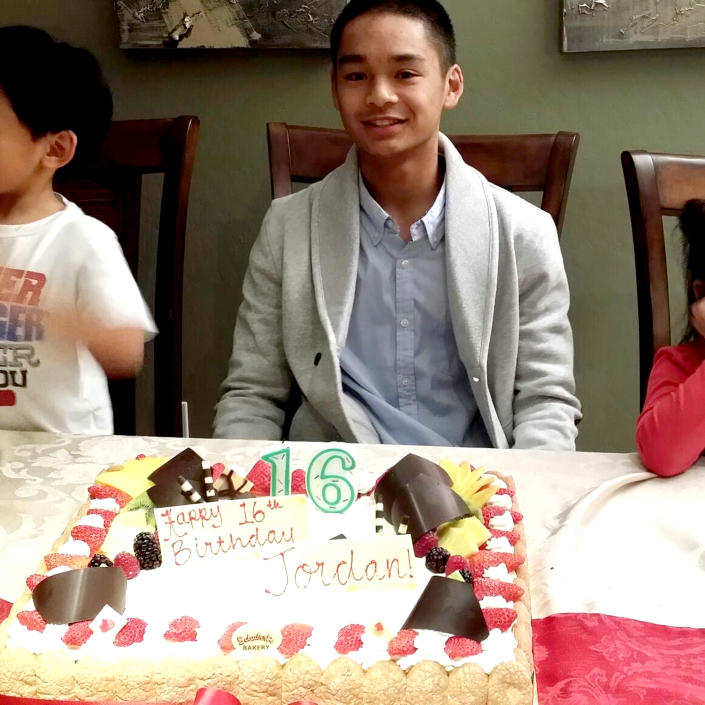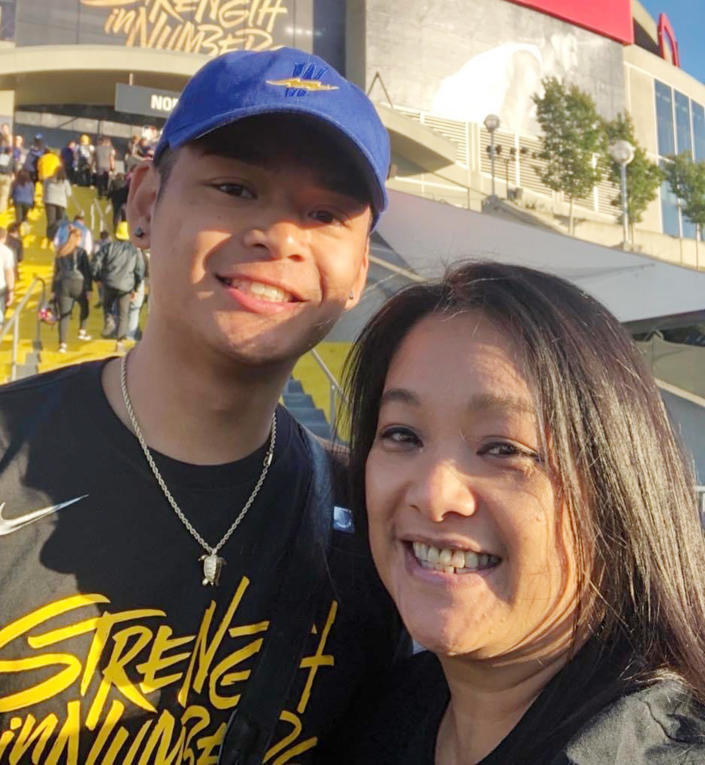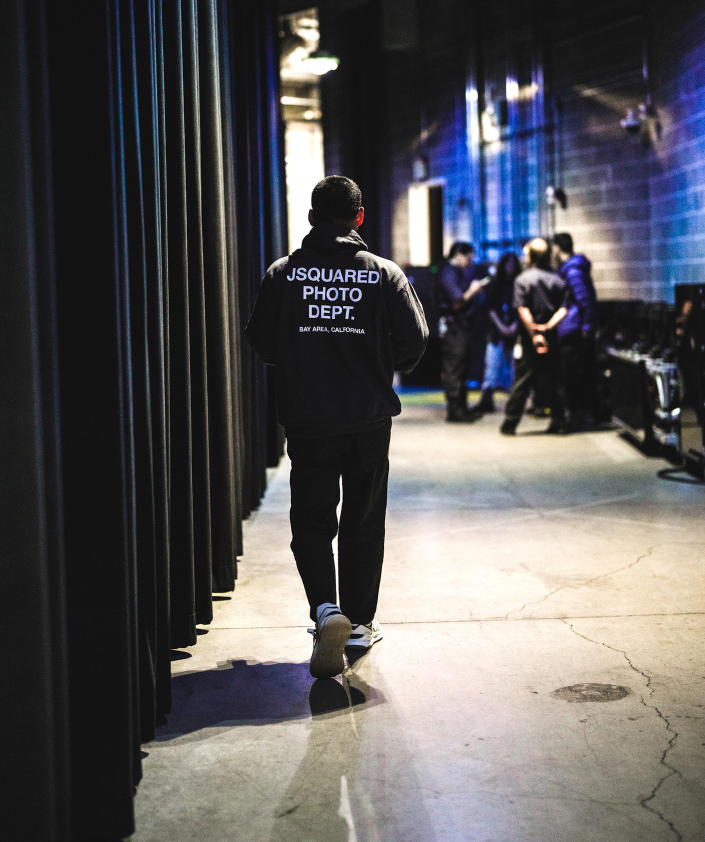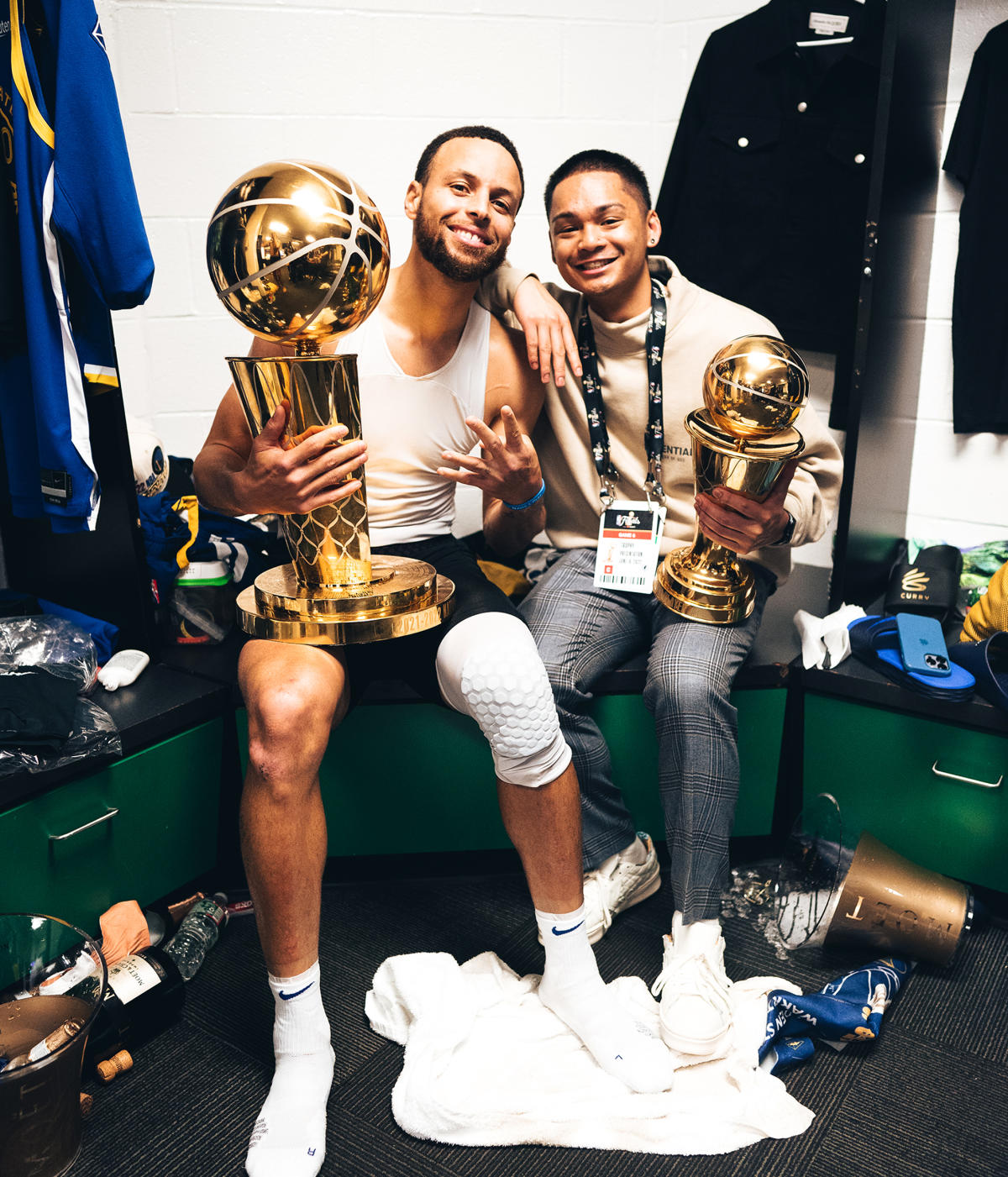[ad_1]
There are people who spend years in school learning the art of working a camera, and then there’s Jordan Jimenez — completely self-taught off his mom’s old Nikon and one photography book for dummies.
Walking around his first gallery opening in January, you could spot 8-by-10 photos from the first time he picked up a camera in June 2015, a few years after he started struggling with depression. Captured on film are memories of him and his friends exploring the streets of San Francisco, where the freelance photographer was born.
“I had no idea what I was doing, how to use it,” he tells TODAY.com, reminiscing about his first camera. “I’d always had fun taking photos on my iPhone with the little fisheye attachment, but that day in 2015 changed everything.”
Before he found his passion for photography, Jimenez’s first love was basketball. He started playing in elementary school and became enamored after attending his first Golden State Warriors game.
“Just like every other kid, I just wanted to go to the NBA, which is, you know, such a silly, silly dream,” Jimenez, who goes by JSquared on social media, says.
Being a part of his local basketball community meant everything to the now 25-year-old. Through basketball, he met his best friends and found an outlet to cope with his depression. So, when Jimenez got injured playing sports in high school, his whole world came crashing down.
That’s when he picked up a camera, which didn’t just change his life — it saved it.
“Photography saved my life”
Jimenez likes to joke that his mental health struggles helped him find his way to photography. “As soon as I picked up the camera, I realized (photography) really does help you see life in such a different way,” he says.
The photographer started struggling with depression as a kid. Growing up in Daly City and San Bruno right outside of San Francisco, he says he felt pressure to be the best at everything, from school to sports.
His teenage years only escalated his mental health struggles. His parents got divorced, his grandma died, and he dealt with a serious concussion that stopped him from playing basketball.
Then, during his senior year of high school, Jimenez started taking pictures. He’d venture to San Francisco, where he and his friends would climb on rooftops to capture different vantage points of the city.
His mom, Lisa Rome, recalls the first time her son asked to borrow her camera. “You can have it. Do whatever you want to do with it. I’m not using it,” she remembers telling him.
The next thing she knew, Jimenez was eagerly showing her the latest collection of photos he’d shot.
“I was trying to find the beauty in life and the beauty in the smallest things. Photography became my new outlet of seeing the world in a positive way,” Jimenez says.
“It was like, how can I show other people what’s beautiful in life? That was my vision with photography, and it’s also my way of giving back and showing people life’s OK, there’s so many beautiful things,” he adds.

Lauren Cook, a clinical psychologist, tells TODAY.com that when we’re passionate about how we spend our time, we experience an elevated level of enthusiasm in our lives that makes us feel excited to start and move thorough our day.
“Passion can be an antidote to so many things that can connect back to depression,” she says. “We can notice increased energy, less fatigue and more motivation — all things that help combat depressive symptoms. We can also see our self-esteem improve because we feel proud of ourselves for living in alignment with our values.”
From the court to the sideline
After graduating from high school, Jimenez attended the University of San Francisco. While in school, he continuously wondered how he could combine his loves of photography and basketball.
A year and a half later, in February 2018, he dropped out of school to pursue photography full time.
“I wanted to cry,” Rome says, remembering when he told her. “But also because of everything he went through, I just wanted him to be happy. He had to take that change. Life is too short.”

To get his foot in the door, Jimenez reached out to old coaches and trainers, asking to photograph practices and workout sessions for free. Every opportunity he could find, Jimenez took it and ran.
“It was all about being in the right place with the right people at the right time,” he says.
In March 2018, after leaving school, he photographed his first big event, McDonald’s All-American Game in Atlanta, an event for top high schools from around the country. There, he created connections with people that led him to photograph his first Euroleague game in Spain a week later, where the young Luka Doncic played for Real Madrid.
The following year, Jimenez met Stephen Curry for the first time while working as a production assistant for a Slam Magazine cover shoot. From there, the two kept building their relationship through run-ins at games photo shoots.
Then, by chance, while at the Unlimited Potential Basketball training facility in Burlingame, California, Jimenez met Jordan Poole, at the time a newly drafted Warriors guard.
The two clicked over their love of basketball and photography, sparking a true friendship that brought Jimenez to the Warrior’s court.

A few years later, in June 2022, Jimenez found himself in the Warriors’ locker room with Curry, Poole and the rest of the team after they’d won the NBA Championships. Thinking back to this moment, Jimenez couldn’t help but recall how surreal it felt.
“I had all of these dreams growing up of wanting to work for the Warriors, but I didn’t know how I would make that happen,” he says.
“To be able to be in a locker room and be able to photograph the championships, the biggest moment of these guys’ lives, it was such a surreal feeling. I play a little bit of a role in telling their story and documenting history,” he adds.
Jimenez recalls a photo he captured of Poole not long after his win. The two were on a boat together in Italy during the summer. While the photo is a simple shot of Poole looking into the camera, Jimenez sees more in the moment.
“For me, it’s such a beautiful moment because, four years ago, people were talking about (how) he wasn’t going to be in the league. Now here we were in Italy … after the championship,” he says.
“It’s all these little moments where nobody might not even understand the context behind it — what the emotions were when I took the photo — but for me, all of these photos are just timestamps of my life,” he adds.
“Capturing the beauty in life”
Jimenez’s perception of a good photo has nothing to do with rules. Instead, it’s all about how a picture makes him feel.
“If I look at it, and I’m like, ‘Damn, that’s a good photo,’ that’s kind of all it is,” he says. “It’s not ever too analytical in the sense of, ‘This is good or bad,’ but it’s like, how did the photo make you … look at the world?”
The photo he gets the most compliments on is a picture of Curry during a game turning around. But his favorite is a lesser-known photograph of a sunset in Maui. While in his eyes, it’s a terrible photo, it’s the memory behind it that holds meaning.
“The photo I have is not that good, but I remember how that moment made me feel, like you really feel like you’re on top of the world,” he says.
“As I get to document those people in places, I’m also documenting all the places and people that I’ve come across and I’ve been lucky enough to experience,” he says.

Photography, especially in the basketball, has also given Jimenez a platform to represent his Filipino culture in spaces where he says not many people look like him.
“It’s also about representation and showing (to) … Filipino people, Asian (people), if I can do it, so can everybody else,” he says.
“If this Filipino kid from the Bay Area … can go ahead and come in and dominate the space in a certain way, then anything’s possible,” he adds.
Looking back, Jimenez isn’t sure where he’d be if he hadn’t picked up a camera and starting shooting. As hard as his journey dealing with depression is, he’s thankful and eager to learn from everyone he encounters.
“Everybody has something to offer,” he says. “As a photographer, I’m always looking for a deeper meaning, observing people’s mannerisms or the way they dress to teach people out their role in the world.”
Of course, Jimenez still has moments where he struggles, but when that happens, he takes extra time practice gratitude and look at the life he’s captured through his lens.
“I don’t think depression really ever fully goes away. But being able to understand how to deal with it is such an important thing,” he says.
This article was originally published on TODAY.com
[ad_2]
